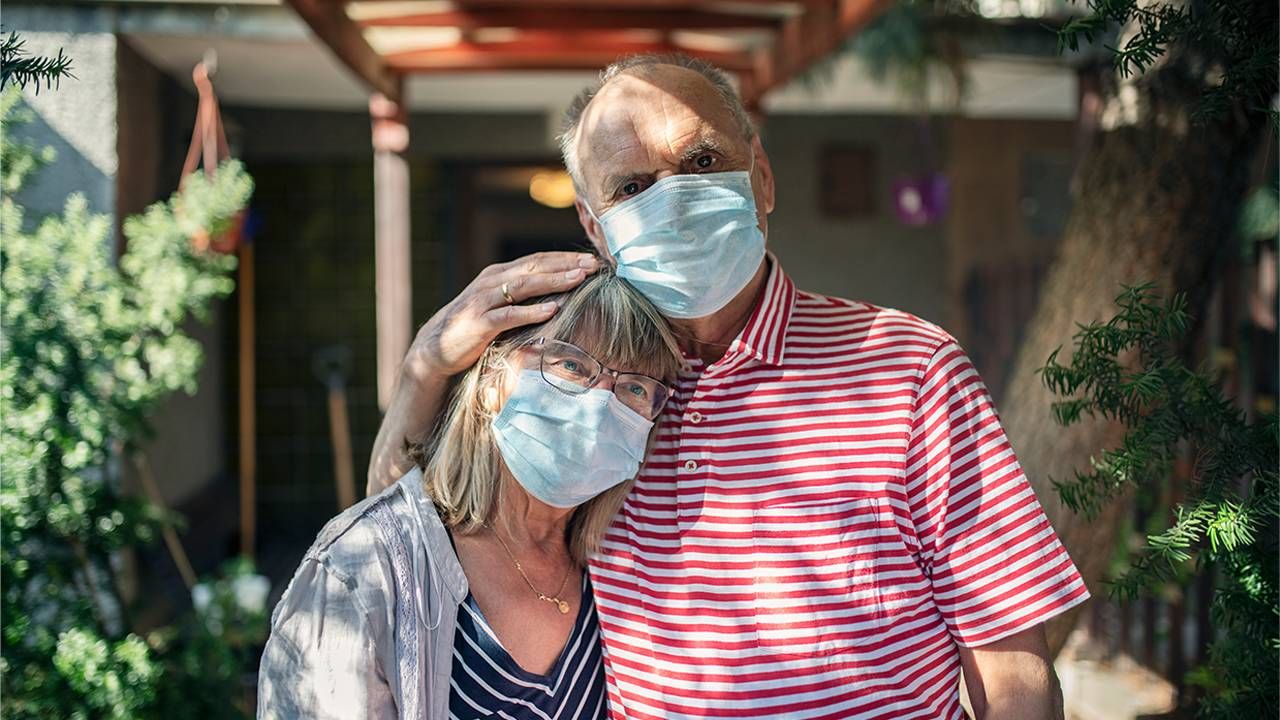When Everyone is Returning to 'Normal' But You
Many people with underlying health conditions are still apprehensive about COVID and continue to refrain from being out in public
After over two years of dealing with COVID, everyone wants to put the pandemic in the rearview mirror. With cases on the decline in most states, many places have decided to lift restrictions including mask mandates (although still required at airports and on planes until at least April 18, possibly longer) and vaccine requirements so that people can return to normal.

But for people with underlying health conditions, it still isn't possible to go back to their pre-pandemic everyday lives.
Rena McDaniel, 52, of South Carolina, has a rare form of rheumatoid arthritis. "Before the pandemic, I was able to go out shopping and meet friends for lunch," she says. "Now it's been over two years and I am still afraid to leave the house for fear of catching COVID and getting really sick."
We Are All in This Together
When the pandemic began in the United States in March 2020, the world seemed to halt. Schools closed, offices went remote and social events were canceled. While essential workers fought the pandemic, everyone else remained home to stay safe. As scary as it was, there was also a camaraderie.
"No one had any idea it would go on for this long."
Maritza Martinez Quintana, 56, of Puerto Rico, was diagnosed at age 40 with myasthenia gravis, an autoimmune disease. She remembers her doctor calling her as soon as the pandemic began and warning her that she needed to stay home.
"It was hard, but we all thought it would just be for a few weeks," says Martinez Quintana. "No one had any idea it would go on for this long."
As the world slowly started to re-open, many places instituted protocols to stop the spread of the virus, such as social distancing rules and mask mandates. Once the vaccine was available, proof of vaccination was (and still is) required to enter many venues.
Martinez Quintana says, "Between the mask mandates, vaccinations and cases declining, I had more confidence and felt safer going to some public places. "
But now, Martinez Quintana is becoming more apprehensive. Restrictions are being lifted but new variants (like the highly contagious Omicron subvariant known as BA.2) continue to sprout up.
"My mother recently remarked that it looked like the end of the pandemic phase was drawing near. But for people like me who are on immunosuppressive medications, it will take a while before we can begin getting clearance from our physicians to go out and about without a mask," Martinez Quintana says. "I know I'll have to deal with people asking, 'Why are you still utilizing a mask?' It's going to be a circus."
No Return to Normal
According to Dr. Sanjeet Singh Dadwal, Chief, Division of Infectious Diseases, Department of Medicine at City of Hope in California, "COVID is still out there, as well as other respiratory viruses like RSV (Respiratory Syncytial Virus) and the flu. If you have a compromised immune system due to illness or a transplant, you still need to be vigilant. People who come in contact with this vulnerable population also have to be mindful."
Feelings of Isolation
It can feel isolating to have lingering fears about COVID while others have moved on with their lives. McDaniel says she has developed anxiety about going out and seeing people.
"I still haven't been to a restaurant. The only people I see in person are my husband, two daughters, and grandchildren," she explains.
Adds Martinez Quintana, "I want to go back to activities and enjoy things like going out to dinner without fear, but it is hard to navigate. I have trouble believing the pandemic is over."
"Feeling almost like you've been 'left behind' while others begin to travel again, or even run simple errands without thinking about masks or crowds, can feel limiting and lonely," explains Alyssa Mairanz, owner and executive director of Empower Your Mind Therapy.
Support Systems and Self-Care
While the pandemic has been challenging, McDaniel and Martinez Quintana have found silver linings.
"I have had a lot of time to think. I started a blog/journal to help me with my feelings and do watercolor [painting]," says Martinez Quintana. "My life isn't as big as it used to be, but it is not bad either."
"I want to go back to activities and enjoy things like going out to dinner without fear, but it is hard to navigate."
For McDaniel, staying connected with friends through phone calls and emails has been helpful. She has also developed a stronger appreciation for being outdoors.
"Getting outside and gardening, which I started doing during the pandemic, has saved me," she says. "The fresh air gives me new breath. Sometimes, my husband and I go for a car ride, not to go anywhere but to get out of the house."
Both Martinez Quintana and McDaniel are grateful that they have supportive partners. Martinez Quintana says, "I'm lucky. My husband has been the spine holding our family together. He has been doing all the food shopping and errands for the past few years."
Respect for Each Other
"Everyone has different tolerance levels, whether they are sick or not, for dealing with a global pandemic," explains Mairanz. "Being ill comes with its own stressors, so that a pandemic will add extra stress and difficulties to everyday life. This situation is very personal and subjective."
If you are lucky enough to be able to go back to more normal activities without restrictions, try to be conscious of those who are not.
Dadwal says, "If you are going to be in contact with a person with a compromised immune system, you must be vaccinated and boosted for COVID as well as vaccinated for the flu. Before you see them, you should take a home antigen test. And if you think you have cough or cold symptoms, even if you test negative or think you might have allergies, stay away. Reschedule the visit or suggest a video chat instead."
While people may be feeling Zoom fatigue after two years of communicating this way, these connections are critical for those with compromised immune systems.
Mairanz encourages people to check in every so often on friends and family members. "Listen to them and what they need. Sometimes being there and lending an ear is enough to make them feel heard," she adds.
Continue activities such as virtual game nights or book clubs so that friends that aren't able or comfortable going out yet don't feel isolated.
If you see someone still wearing a mask, be compassionate, not judgmental. McDaniel's twin grandchildren still wear masks at school.
"Even though their school doesn't require it, my daughter insists they wear it so that they can spend time with me," she says.
As New York City Health Commissioner Ashwin Vasan wrote in a tweet, "Let's be kind to each other when it comes to managing our own risk. You don't know what life circumstances someone might be accounting for in their choice to mask."


